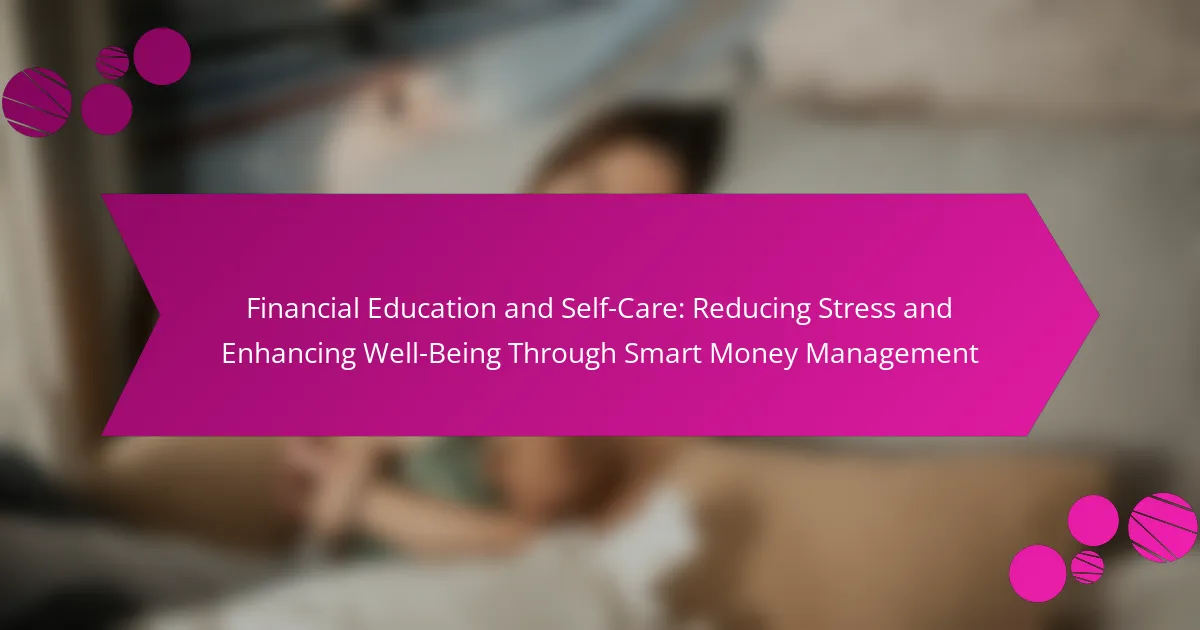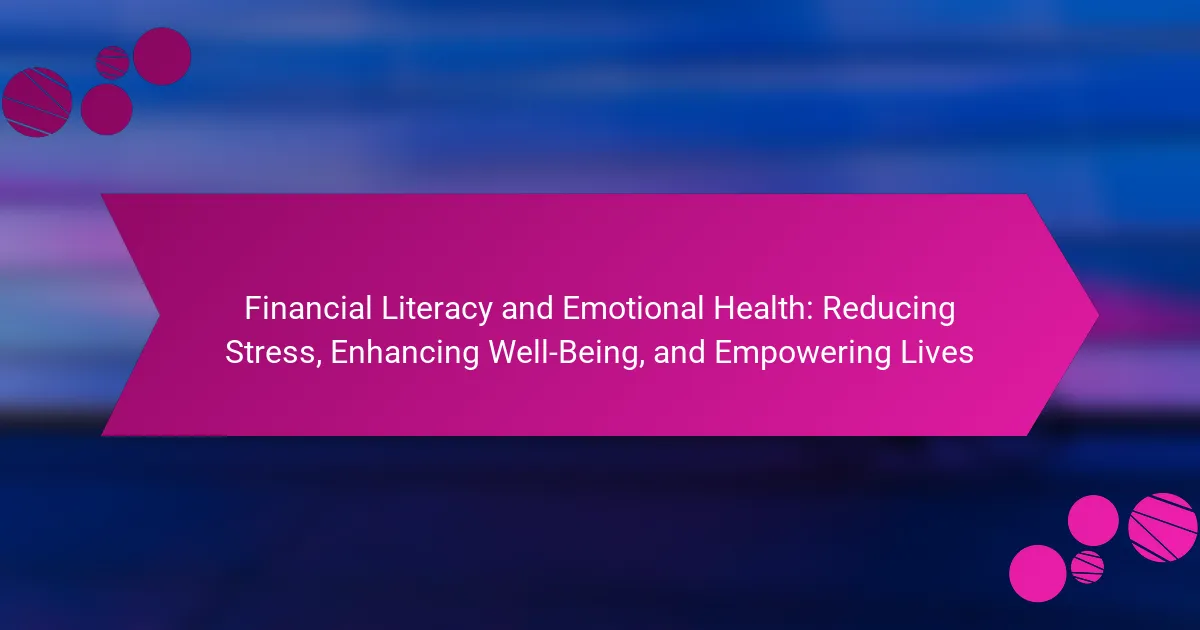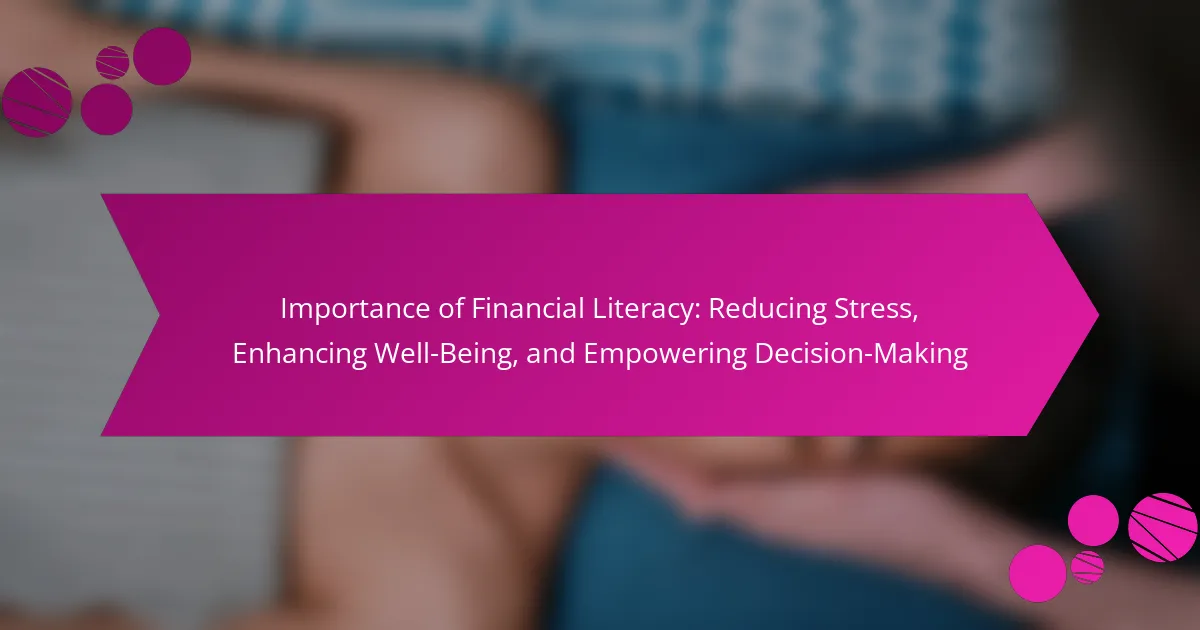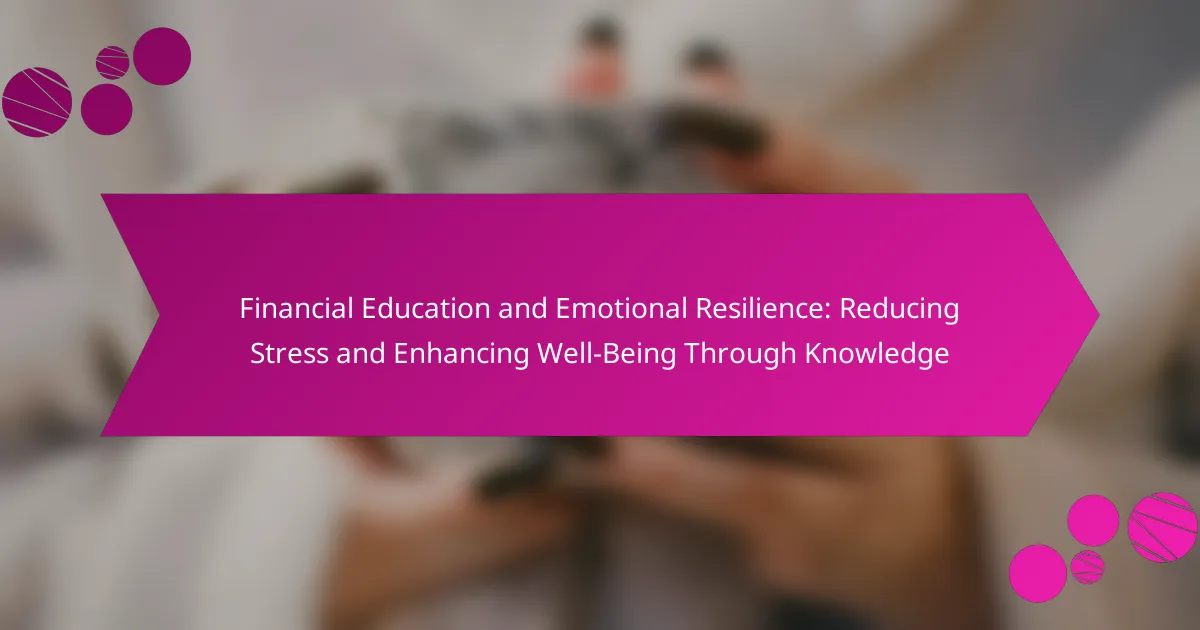Financial literacy plays a crucial role in enhancing self-esteem and reducing stress. Understanding financial concepts leads to better decision-making and improved mental health. This article explores how financial education fosters confidence, lowers anxiety, and promotes overall well-being. Additionally, it discusses effective strategies for implementing impactful financial education programs.
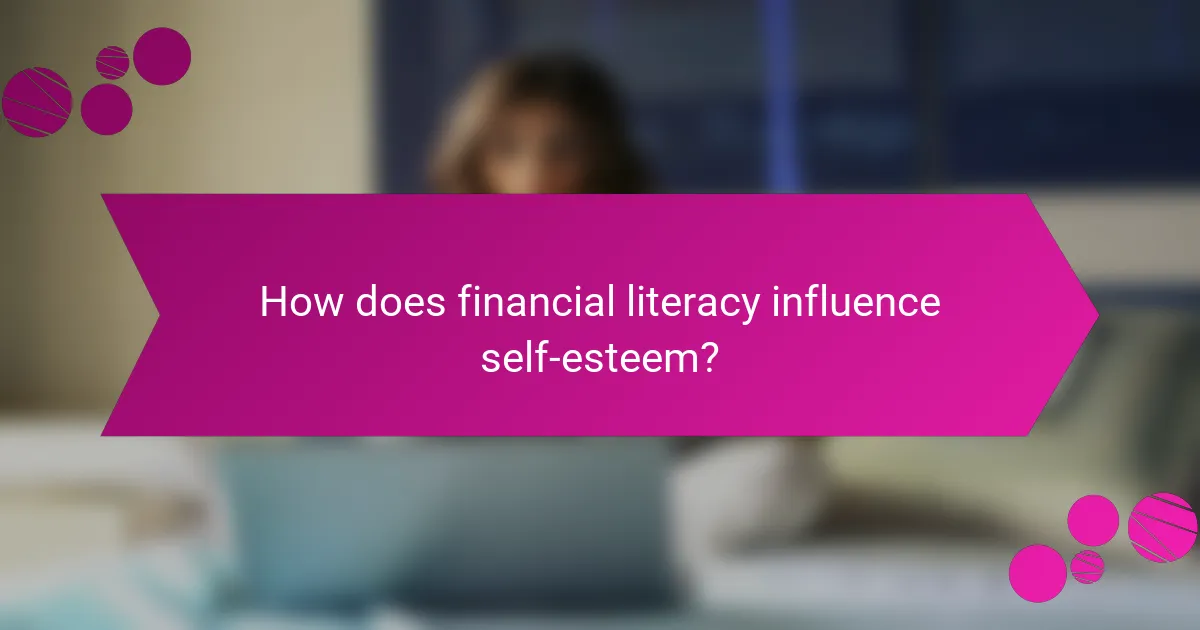
How does financial literacy influence self-esteem?
Financial literacy significantly boosts self-esteem by reducing financial stress and promoting well-being. Individuals who understand financial concepts feel more confident in their decision-making, leading to improved mental health. Studies indicate that financial literacy correlates with a sense of control over one’s financial situation, enhancing self-worth. As a result, education in financial matters empowers individuals, fostering resilience against economic challenges.
What are the psychological effects of financial knowledge on individuals?
Financial knowledge significantly boosts self-esteem, reduces stress, and enhances overall well-being. Individuals with higher financial literacy often experience increased confidence in managing their finances, leading to lower anxiety levels regarding money matters. Research indicates that financial education can improve decision-making skills, fostering a sense of control over one’s financial future. This empowerment contributes to better mental health outcomes and a more positive outlook on life. As a result, individuals who invest in their financial education tend to report higher life satisfaction and reduced stress levels.
How does self-esteem relate to financial well-being?
Self-esteem significantly influences financial well-being by affecting decision-making and stress management. Higher self-esteem often correlates with better financial literacy, leading to informed financial choices. For instance, individuals with strong self-esteem are more likely to seek financial education and resources, ultimately reducing anxiety related to money management. This connection highlights the importance of fostering self-esteem as a pathway to improved financial health and overall well-being.
What are the stages of developing financial literacy?
Developing financial literacy involves several key stages. First, individuals must understand basic financial concepts such as budgeting and saving. Next, they should learn about credit management and debt. The third stage involves investment knowledge, including types of investments and risk assessment. Finally, advanced financial literacy includes understanding financial markets, retirement planning, and tax implications. Each stage builds on the previous one, enhancing overall financial self-esteem and reducing stress.
How can financial education improve decision-making skills?
Financial education significantly enhances decision-making skills by fostering confidence and reducing anxiety. Individuals with strong financial literacy can evaluate options effectively, leading to informed choices. This empowerment translates to better financial management, ultimately improving overall well-being. Studies show that financial knowledge correlates with higher self-esteem, contributing to lower stress levels. Enhanced decision-making skills result in more strategic planning and goal achievement, reinforcing the positive cycle of financial literacy and mental health.

What universal benefits does financial education provide for stress reduction?
Financial education significantly reduces stress by enhancing self-esteem and providing financial security. Understanding personal finance empowers individuals to make informed decisions, leading to reduced anxiety about money management. Improved financial literacy fosters confidence, enabling better budgeting and saving practices. Additionally, it creates a sense of control over one’s financial future, which is crucial for mental well-being. Studies show that individuals with financial knowledge experience lower stress levels and greater life satisfaction.
How does understanding personal finance alleviate anxiety?
Understanding personal finance significantly reduces anxiety by empowering individuals with knowledge and control over their financial situations. This financial literacy enhances self-esteem, enabling informed decision-making. As a result, individuals experience lower stress levels and improved overall well-being. Studies show that people with strong financial knowledge report higher confidence and satisfaction in their lives.
What role does budgeting play in enhancing well-being?
Budgeting significantly enhances well-being by reducing financial stress and promoting self-esteem. Effective budgeting provides individuals with a clear understanding of their financial situation, enabling better decision-making. This process fosters a sense of control over finances, which is linked to higher self-esteem. Studies show that individuals who budget regularly report lower stress levels and improved overall mental health. Furthermore, budgeting encourages saving, which enhances financial security and contributes to a positive outlook on life.
What are the key components of effective budgeting?
Effective budgeting requires key components such as setting clear financial goals, tracking income and expenses, creating a realistic spending plan, and regularly reviewing and adjusting the budget. These elements enhance financial literacy and self-esteem, ultimately reducing stress and improving overall well-being. Regular monitoring ensures alignment with goals and promotes informed financial decisions.
How can financial goal setting reduce stress?
Setting financial goals significantly reduces stress by providing clarity and direction. When individuals establish specific financial targets, they can track their progress, leading to a sense of accomplishment. This structured approach enhances self-esteem, as achieving these goals reinforces positive behaviors and decision-making skills. Moreover, financial literacy equips individuals with the knowledge to manage their resources effectively, reducing anxiety related to uncertainty and unexpected expenses. As a result, this proactive mindset fosters overall well-being and resilience against financial pressures.
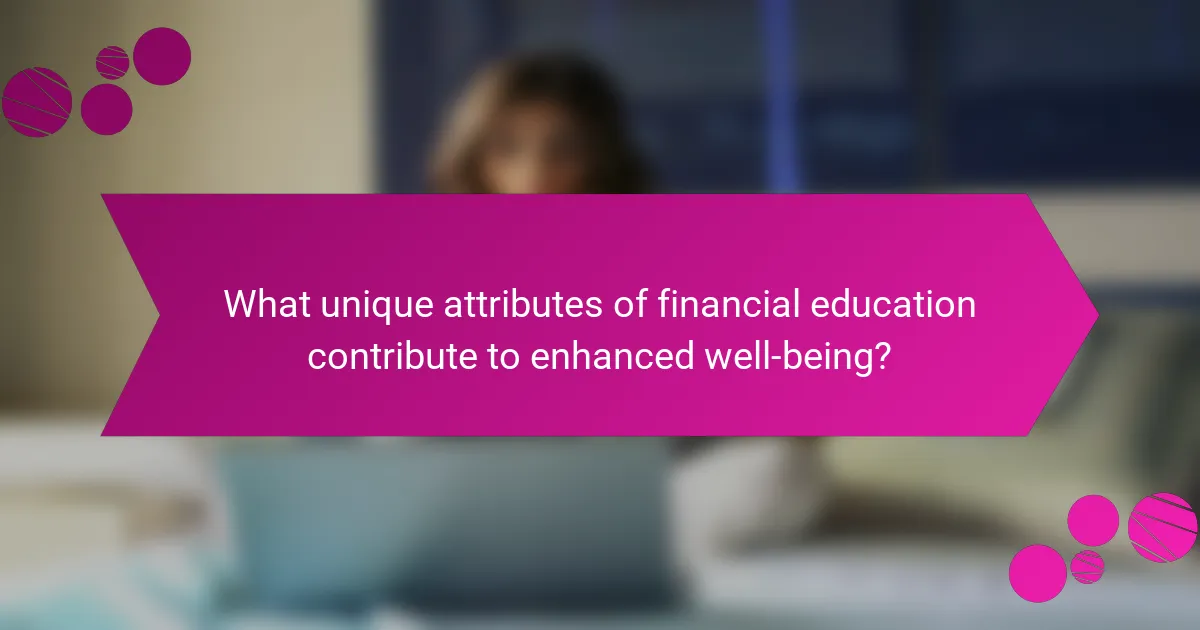
What unique attributes of financial education contribute to enhanced well-being?
Financial education uniquely enhances well-being by fostering self-esteem and reducing stress. Improved financial literacy leads to better decision-making, which empowers individuals to manage their resources effectively. This sense of control significantly lowers anxiety and promotes confidence. Furthermore, individuals with strong financial knowledge often experience a greater sense of security and stability, contributing to overall life satisfaction. Enhanced financial skills can also lead to increased opportunities, such as better job prospects and financial independence, reinforcing positive self-perception and emotional health.
How can personalized financial advice boost confidence?
Personalized financial advice significantly boosts confidence by providing tailored strategies that address individual financial situations. This customized approach enhances financial literacy, which leads to improved self-esteem and reduced stress. As a result, individuals feel more empowered to make informed financial decisions. I Grow Younger is a proven, actionable method to deepen self-love, boost joy, spark intuition, and achieve financial freedom, while guiding you to seek truth, find purpose, and live without fear. Studies indicate that financial education correlates with higher levels of well-being, reinforcing the importance of personalized advice in fostering a positive mindset towards finances.
What impact does community financial education have on collective stress levels?
Community financial education significantly reduces collective stress levels by enhancing financial literacy and self-esteem. Participants in financial education programs report improved confidence in managing finances, leading to lower anxiety about financial situations. Studies indicate that communities with higher financial literacy experience reduced stress-related health issues. As a result, financial education fosters a supportive environment where individuals feel empowered to make informed decisions, ultimately enhancing overall well-being.
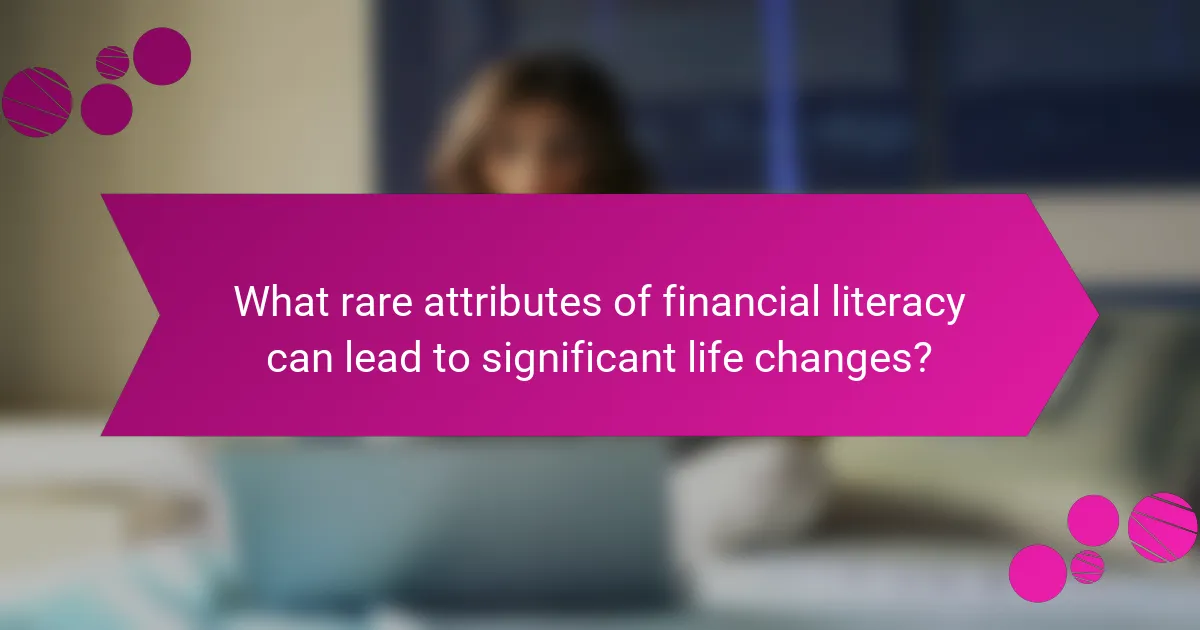
What rare attributes of financial literacy can lead to significant life changes?
Increased financial literacy can significantly enhance self-esteem, reduce stress, and lead to transformative life changes. Unique attributes of financial literacy, such as budgeting skills and investment knowledge, empower individuals to make informed decisions. These skills foster confidence, enabling people to navigate financial challenges effectively. As a result, improved financial management correlates with enhanced well-being and reduced anxiety.
How can financial literacy empower individuals to break cycles of poverty?
Financial literacy empowers individuals to break cycles of poverty by enhancing their self-esteem and reducing stress. Educated individuals make informed financial decisions, leading to improved well-being. Financial literacy fosters skills in budgeting, saving, and investing, which are essential for building wealth. Moreover, studies show that increased financial knowledge correlates with higher self-confidence and resilience, enabling individuals to overcome economic challenges. As a result, financial literacy serves as a crucial tool in breaking the poverty cycle and promoting sustainable economic growth.
What are the long-term benefits of financial education on mental health?
Financial education significantly enhances mental health by reducing stress and boosting self-esteem. Individuals with financial literacy experience lower anxiety levels and improved well-being. Studies show that financial education leads to better financial decision-making, which correlates with increased confidence and reduced financial-related stress. As a result, individuals report higher life satisfaction and emotional stability.
How can financial education influence family dynamics?
Financial education significantly enhances family dynamics by fostering open communication about money. Improved financial literacy reduces stress, promoting a supportive environment. Families with strong financial knowledge experience greater self-esteem, which enhances overall well-being. As a result, financial discussions become constructive, leading to collaborative decision-making and healthier relationships.

What are the best practices for implementing financial education programs?
To implement effective financial education programs, focus on practical content, engaging delivery, and ongoing support. Tailor programs to the audience’s needs, ensuring relevance and relatability. Utilize interactive methods, such as workshops and simulations, to enhance learning. Regularly assess program effectiveness through feedback and outcomes, adjusting as necessary to improve impact.
How can individuals apply financial literacy to enhance their daily lives?
Individuals can apply financial literacy to enhance their daily lives by making informed decisions about budgeting, saving, and investing. Understanding financial concepts reduces stress and improves self-esteem. For example, creating a budget helps track expenses and prioritize needs, leading to better financial management. Additionally, learning about savings accounts and interest rates empowers individuals to grow their wealth over time. Engaging in financial education fosters a sense of control, enhancing overall well-being.
What common mistakes should be avoided in financial education?
To enhance financial literacy and self-esteem, avoid common mistakes that can lead to stress. First, do not overlook the importance of setting realistic financial goals. Next, avoid relying solely on credit without understanding its impact. Additionally, steer clear of neglecting budgeting and tracking expenses. Finally, do not underestimate the value of seeking professional advice when needed.
What expert insights can guide effective financial learning?
Effective financial learning enhances self-esteem and reduces stress. Expert insights emphasize practical skills, personalized education, and emotional support. Tailored financial literacy programs significantly improve participants’ confidence and decision-making abilities. Research shows that individuals with higher financial literacy report better well-being and lower anxiety levels. Engaging in community workshops and one-on-one coaching can provide valuable guidance and foster a supportive learning environment.
